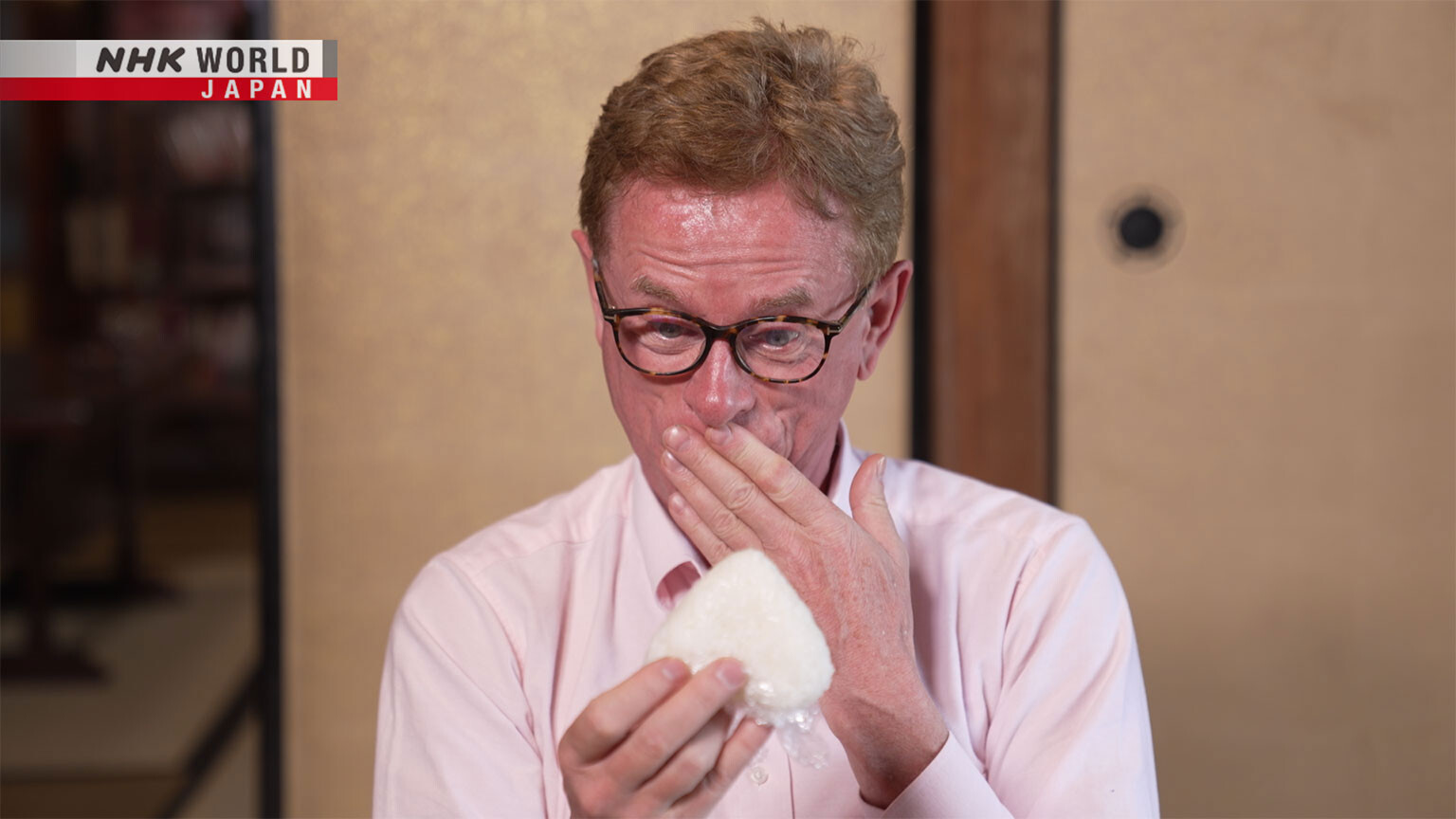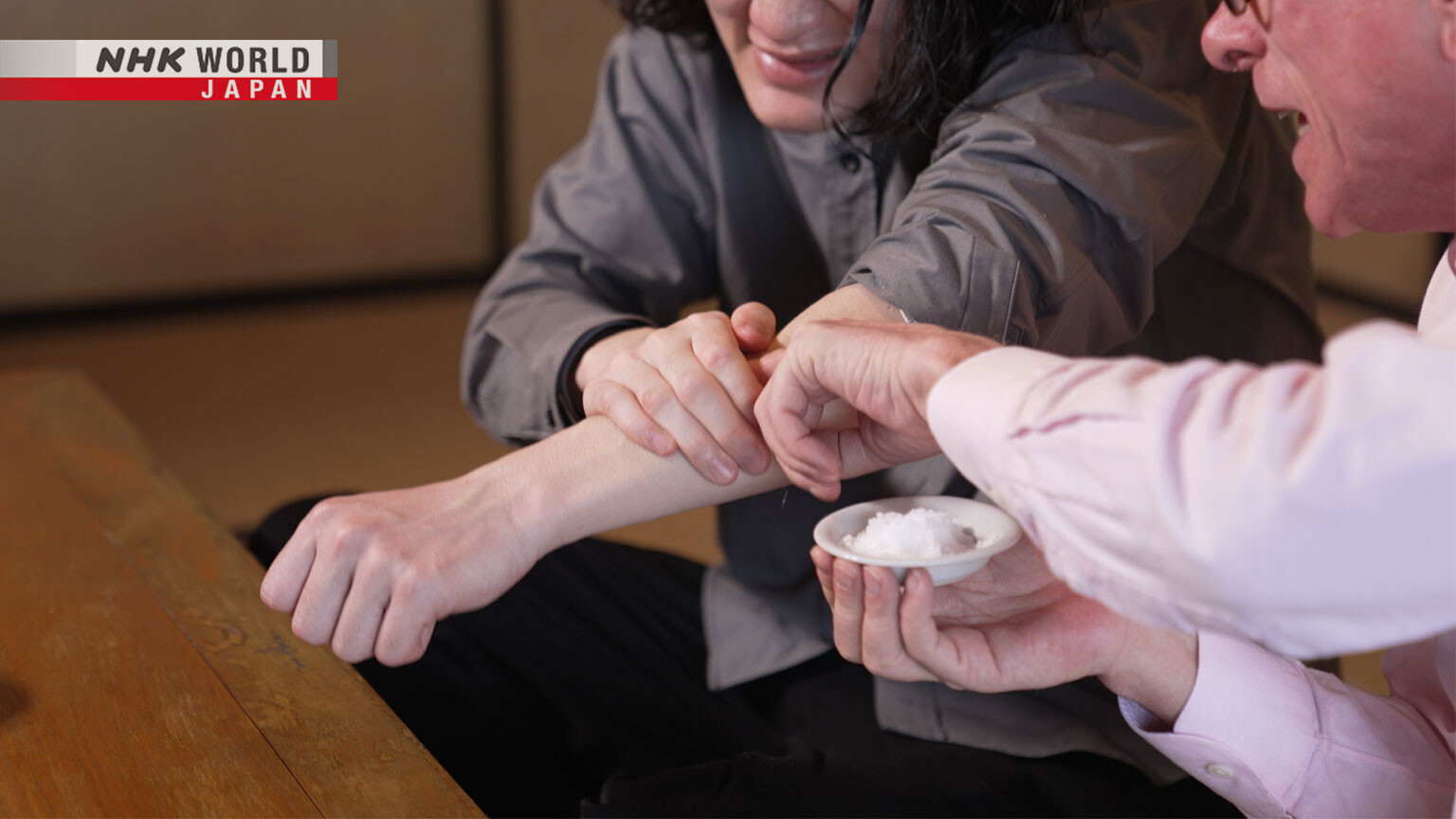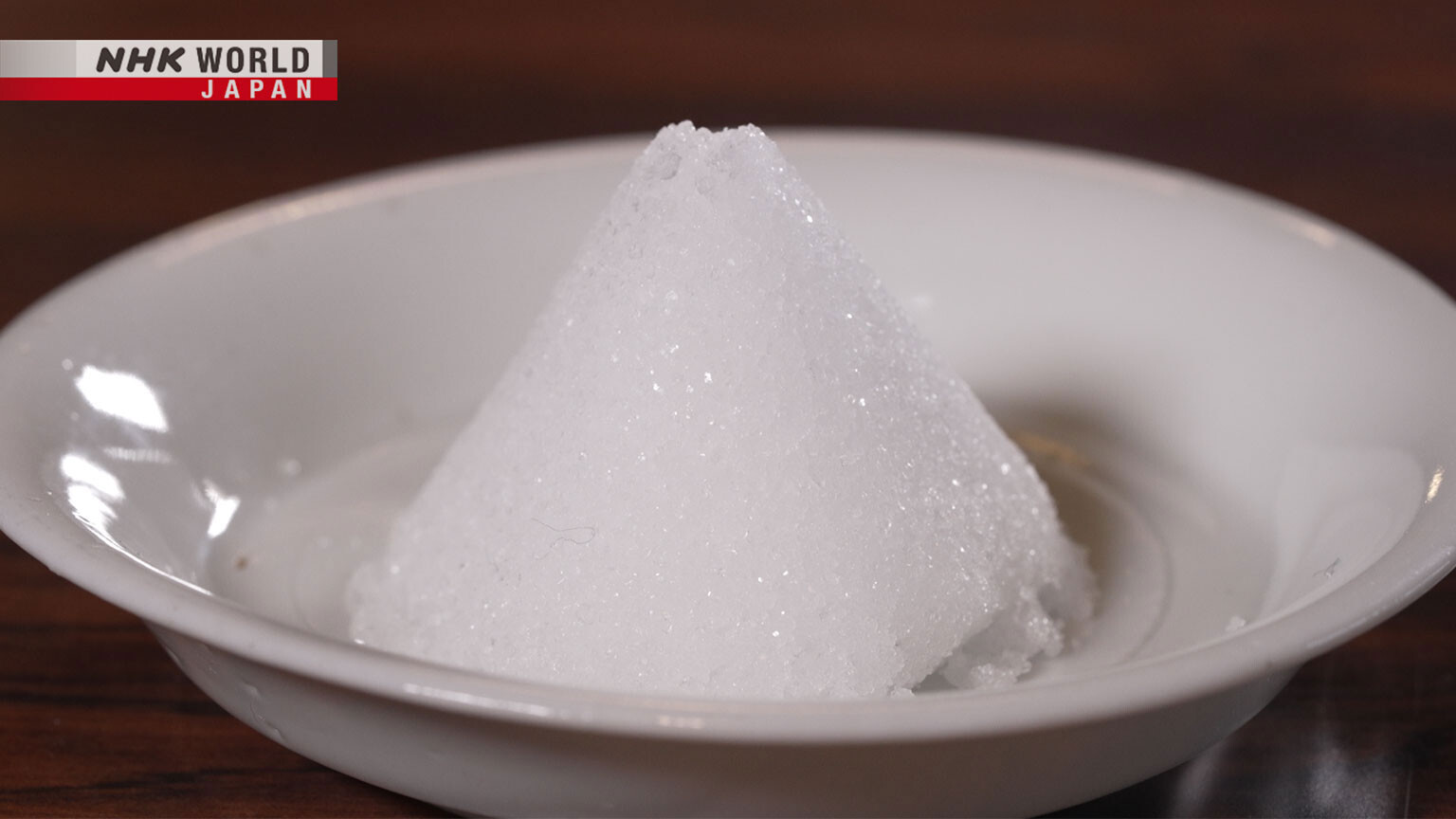Salt
This episode focuses on words related to shio, or salt. Salt played an important role in the development of Japan's food culture and religion, and it continues to add flavor to many Japanese expressions.




Transcript
"Yukigesho"
"Karakurenai"
The Japanese language is rich in unique expressions, that reflect nature and culture.
Magical Japanese.
Today's theme is "shio," or "salt."
Salt is essential for human life.
With no access to resources such as rock salt, Japanese people made salt from seawater.
It was hard, time-consuming work!
Because of that, salt was a precious commodity.
Let's take a look at the rich variety of words related to salt.
Hello, I'm Peter MacMillan.
I was just making some Japanese food - a Peter special.
Salt is essential for creating Japanese flavors.
Salted rice balls, miso soup, soy sauce and pickled plums, all require salt.
The precise amount of salt that you use is also important in Japanese cooking.
Add too much, and it might taste like this:
"shoppai"
This word is used to describe a salty taste.
"shoppai"
"Shoppai" is also used for people's expressions these days, as in the popular phrase "shoppai kao."
"Kao" means "face."
The phrase is used when someone is displeased, or is faced with something unpleasant, and furrows their brows,
just like when they eat something very salty.
When asked for a big favor, she made a "shoppai kao," frown.
"shoppai kao"
Here's another trendy phrase using "salt:"
"shiotaio"
"Taio" is "attitude."
The complete expression literally means a "salty attitude,"
but it's used when aperson behaves coldly or indifferently, to avoid something awkward or troublesome.
I called customer service to explain the problem, but all I got was "shiotaio," the cold shoulder.
"shiotaio"
I've come to the city of Ako in Hyogo Prefecture, which is famous for its salt production.
At this facility, you can make salt using techniques from 1,000 years ago.
In Japan, salt has traditionally been made from seawater.
This is very hard work.
You have to spread seawater on the ground like this, many times over.
When the moisture evaporates, you end up with very salty sand.
After that you filter seawater through it to get a concentrated brine, which you then boil to extract the salt.
Salt has long been used to preserve food, due to its antibacterial properties.
This gave rise to the following expression:
"shiozuke"
"Zuke" means "pickled."
"Shiozuke" refers to the process of pickling, and also to pickled foods themselves.
Today, the image of something that remains unchanged, or stopped in time through pickling,
is used in business to refer to abandoned projects.
What happened to that project we were working on?
All the departments ran out of resources, so it's been "shiozuke," abandoned.
"shiozuke"
"kizuguchi ni shio o nuru"
"Kizuguchi" means a "wound."
"Nuru" means "to apply."
Just like applying salt to a wound is painful,
this expression refers to inflicting damage on a person, who is already injured or hurt in some way.
The boss blamed her for her mistake, and then brought up another recent mistake she'd made.
The boss should know better than to "kizuguchi ni shio o nuru," rub salt into a wound.
"kizuguchi ni shio o nuru"
The next phrase first appeared about 500 years ago.
"teki ni shio o okuru"
"Teki" is "enemy," and "okuru" means "to send."
In the 16th century, warlords fought throughout Japan to gain control of the country.
Legend has it that a certain warlord sent salt to enemies who needed it.
Today, the phrase is used to express the idea that helping one's rivals can ultimately help you.
Our competitor seems to be short on materials.
Let's "teki ni shio o okuru," help a rival in need, and share some of ours.
Otherwise, the whole industry might collapse.
"teki ni shio o okuru"
Salt has played an important part, not only in the development of Japan's food culture, but also in its religion.
"kiyome no shio"
"Kiyome" means "purification."
Using salt for purification is a custom in Shinto, the ancient Japanese religion.
Seawater was originally used to purify the body, to treat illness or wish for good health.
Salt, which came from seawater, was believed to have similar benefits.
Even today, festivals at Shinto shrines include purification rituals, that use saltwater or mounds of salt.
In sumo, Japan's national sport, you might have noticed that the wrestlers toss salt in the arena before every bout.
They do this because the arena is a sacred place.
Tossing salt is a way to purge evil spirits and pray for the safety of the wrestlers.
Salt production techniques became more advanced in the Edo Period,
and people began to use large salt pans, like this one, to boil thick brine and extract salt.
The spread of salt-making techniques across Japan led to the establishment of the Japanese cuisine we know today, with its ample use of salt.
Salt is the result of hard work.
We must give it the respect it deserves.
"teshio ni kakete"
"Teshio" is a small plate with a mound of salt.
In the Edo period, "teshio" used to be served alongside meals, so people could season food to their liking.
From this, "teshio ni kakete" came to mean caring for something or someone on your own, instead of delegating the work to others.
The student that she coached "teshio ni kakete," with great care, became a champion.
"teshio ni kakete"
Delicious! To eat a rice ball made with great care, or "teshio ni kakete," after a hard day's work...
it's like a small taste of heaven.
See you next time. Bye!